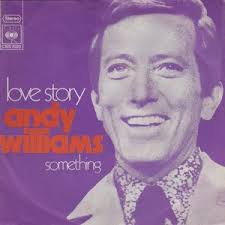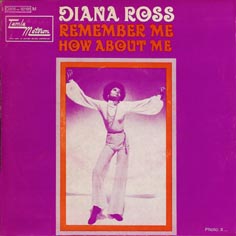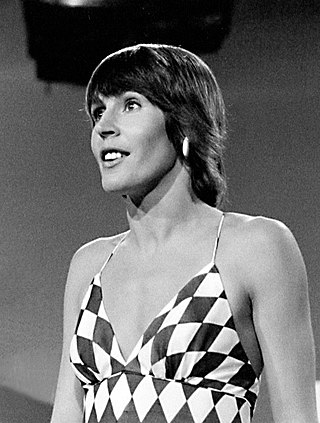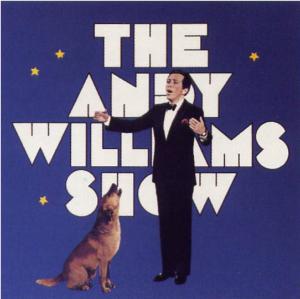"In the Chapel in the Moonlight" is a 1936 popular song written by Billy Hill, and first performed by Shep Fields.

"I'll Never Fall in Love Again" is a popular song by composer Burt Bacharach and lyricist Hal David that was written for the 1968 musical Promises, Promises. Several recordings of the song were released in 1969; the most popular versions were by Dionne Warwick, who took it to number 6 on Billboard magazine's Hot 100 and spent three weeks topping the magazine's list of the most popular Easy Listening songs, and Bobbie Gentry, who topped the UK chart with her recording and also peaked at number 1 in Australia and Ireland, number 3 in South Africa and number 5 in Norway.
"Don't Break the Heart That Loves You" is an American song written by Benny Davis and Murray Mencher. The song was a success for two artists in two different genres: Connie Francis in the pop field in 1962 and Margo Smith as a country version in 1978.

"(Where Do I Begin?) Love Story" is a popular song published in 1970, with music by Francis Lai and lyrics by Carl Sigman. The song was first introduced as an instrumental theme in the 1970 film Love Story after the film's distributor, Paramount Pictures, rejected the first set of lyrics that were written. Andy Williams eventually recorded the new lyrics and took the song to number nine on Billboard magazine's Hot 100 and number one on their Easy Listening chart.

"I Won't Last a Day Without You" is a song by The Carpenters with lyrics written by Paul Williams and music composed by Roger Nichols. It was released in the U.K. in September 1972, paired with "Goodbye to Love" as a double-A side. The single reached No. 9 and spent 14 weeks on the chart. It was later released in the U.S. and became a hit single for them in 1974, reaching No. 11 on the Billboard Hot 100 chart and number one on the easy listening chart. It was the Carpenters' ninth No. 1 on the easy listening chart.

"Tell Me a Lie" is a song composed by Mickey Buckins and Barbara Wyrick. Originally recorded by Lynn Anderson for her 1974 What a Man My Man Is album, it was released later that same year as a single by Sami Jo Cole, who took it to number 21 on both of the major U.S. pop charts. It also charted in Canada (#17). Cole's version was also an Adult Contemporary hit, reaching number 14 in the U.S. and number 27 in Canada.

"Remember Me" is a 1970 single recorded and released by singer Diana Ross on the Motown label and was included on her 1971 album Surrender. The song was released as the album's first single on December 8, 1970 by the label. It was written and produced by Ashford & Simpson. In the US, the song was Ross' third top forty pop hit within a year, peaking at number 16 on the Hot 100 chart and number 10 on the soul chart. It was also Diana Ross' third entry on the Easy Listening chart, where it went to number 20. It gave Diana her third gold single in a year and her third top 10 charting single in Cash Box, peaking at number eight. Overseas, "Remember Me" reached the top ten in the UK, where it reached number seven. It was the lead single from Ross' 1971 album, Surrender.

"Last Time I Saw Him" is a 1973 song by Diana Ross, being a composition by Michael Masser and lyricist Pam Sawyer. The track was produced by Masser and released as the first single on December 6, 1973, from her album of the same name.

"Show and Tell" is a popular song written by Jerry Fuller and first recorded by Johnny Mathis in 1972. This original version made it to #36 on the Easy Listening chart.

"We'll Sing in the Sunshine" is a 1964 hit song written and recorded by Gale Garnett which reached No. 2 in Canada, and No. 4 on the U.S. Billboard Hot 100 chart for the week ending 17 October 1964. It also enjoyed success on easy listening and country music radio stations, spending seven weeks at No. 1 on the Billboard Easy Listening chart and No. 42 on the country chart. The Cash Box Top 100 ranked "We'll Sing in the Sunshine" at No. 1 for the week of 31 October 1964, and it also reached No. 1 in Garnett's native New Zealand that November. In Australia, "We'll Sing in the Sunshine" afforded Garnett a Top Ten hit with a No. 10 peak in October 1964. Garnett's sole Top 40 hit, "We'll Sing in the Sunshine" won the Grammy Award for Best Ethnic or Traditional Folk Recording in 1965.

"Cupid" is a song by American singer Sam Cooke, released on May 16, 1961. It charted at number 17 on the Billboard Hot 100 and number 20 on the Hot R&B Sides chart; the track performed best in the United Kingdom, peaking at number seven on the UK Singles Chart. The song is featured on Cooke's greatest hits album, The Best of Sam Cooke (1962). Cooke's producers had asked him to write a song for a girl they had seen on a Perry Como TV show—but once they heard her sing, they kept "Cupid" for Cooke himself.

"Until It's Time for You to Go" is a song from the 1965 album Many a Mile by American singer-songwriter Buffy Sainte-Marie. Sainte-Marie included a French-language reworking of the song, "T'es pas un autre", on her 1967 album Fire & Fleet & Candlelight. French translation was made by Quebecer songwriter Claude Gauthier.
"Singing My Song" is a song recorded by American country music artist Tammy Wynette, who co-wrote the song with Billy Sherrill and Glenn Sutton. It was released in March 1969 as the first single from her compilation album Tammy's Greatest Hits. The song was Wynette's fifth number one on the country charts as a solo artist. The single spent two weeks at number one and a total of fourteen weeks on the charts.

Australian-American singer Helen Reddy (1941–2020), often referred to as the "Queen of 70s Pop", recorded 18 studio albums, seven of which have achieved sales of 500,000 units in the US for which they were awarded Gold certification by the Recording Industry Association of America. One of those seven, I Am Woman, eventually went Platinum by reaching sales of one million copies, and her first compilation album, Helen Reddy's Greatest Hits, was awarded Double Platinum status in 1992 for hitting the two million sales mark. The respective US and Canadian album charts in Billboard and RPM magazine each had appearances by 10 of these LPs during the 1970s.

"Something Better to Do" is a song written by John Farrar and recorded by Olivia Newton-John. The song was released in September 1975 as the lead single from Newton-John's sixth studio album, Clearly Love. The narrator of the song muses that she's having a hard time adjusting to life without her departed lover; even the birds are wasting their songs singing to her, and until her beloved returns, "the birds will have to find something better to do."

Raindrops Keep Fallin' on My Head is the twenty-fifth studio album by American pop singer Andy Williams and was released in the spring of 1970 by Columbia Records. Williams was less focused on covering recent hits on this project and instead selected several songs from the singer-songwriter genre. The concept for the album came from Mason Williams, who contacted producer Dick Glasser about co-producing an album that would give Williams's fans a medley of songs that did more than just highlight the most familiar parts of popular songs but rather focus on a unifying theme or storyline of songs that were not necessarily hit records. Billboard magazine opined that the album "may well be titled 'A Journey Through Life.' Through carefully selected songs it conveys a message of dreams, hopes, reality, frustrations and ultimate truth."

The Andy Williams Show is the twenty-sixth studio album by American pop singer Andy Williams that was released in the fall of 1970 by Columbia Records. In his review on AllMusic.com, William Ruhlmann writes that "The Andy Williams Show LP was not a soundtrack recording from the TV series, and it was not really a live album, although it gets categorized as such. What appears to be the case is that Columbia Records took a group of Williams' studio recordings, most of them made during the summer of 1970 and consisting of his versions of recent soft rock hits, and added a lot of canned applause along with some of the kind of musical interludes used to usher numbers on and off on the show, including bits of its "Moon River" theme music at the start and the finish."

Love Story is the twenty-seventh studio album by American pop singer Andy Williams that was released on February 3, 1971, by Columbia Records. This was another in his series of cover albums, but the title track, subtitled "Where Do I Begin", was the one song included that he originated.

Love Story is a compilation album by American pop singer Andy Williams that was released in the UK in July 1971 by the CBS Records division of Columbia and was mainly composed of tracks that had not been included on his studio LPs.
"Primrose Lane" is a song made famous by country music singer Jerry Wallace. Originally released in 1959, the song rose to number 8 on the Billboard Hot 100. The song was ranked #47 on Billboard magazine's Top Hot 100 songs of 1959.















